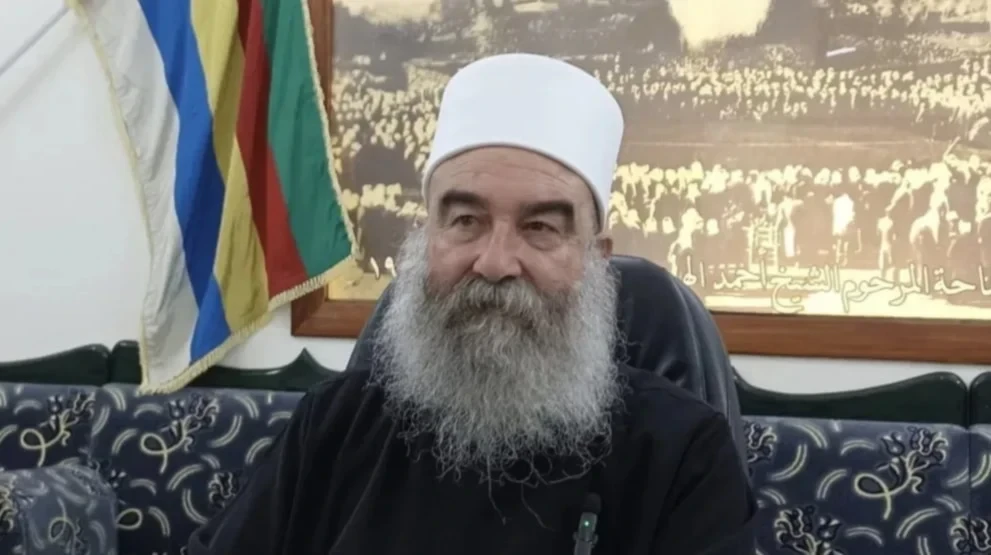Syrian Druze leader censures constitution, actions of interim admin
A prominent leader of the Druze community in Syria underlines that his country is facing numerous challenges as he calls for unity and democratic governance.
-

Senior Druze leader in Syria's al-Suweida, Sheikh Hikmat al-Hijri, in an undated photograph
Sheikh Hikmat Salman al-Hijri, one of the prominent Druze leaders in al-Suweida, strongly criticized the newly issued constitution, stating that it was drafted by "a committee of the same political orientation," paving the way for "one person to hold absolute powers, entrenching authoritarianism rather than establishing a democratic system." He emphasized that "no proper methodology has been reached to build the state, while the interim administration continues to ignore the aspirations of the people and the goals of the revolution."
Al-Hijri accused the interim administration of monopolizing decision-making, saying that it "unilaterally formulates policies and plans without any real participation in discussions or action," adding that "there is no genuine dialogue or exchange of ideas." He specifically criticized the National Dialogue Conference, stating that it "lasted less than five hours and resulted in pre-prepared, overlapping recommendations that fell far below expectations, leaving everyone deeply disappointed."
Expressing his concerns about the current situation, al-Hijri described the prevailing atmosphere as "uncertain, with an imposed reality disguised under misleading slogans designed to present a uniform image to the world." He further stated that "unqualified leaders have been appointed within the administration, while officials in various sectors have been arbitrarily dismissed."
Addressing the recent violent events in Homs and along the Syrian coast, al-Hijri condemned the atrocities committed, likening them to "the brutal practices of ISIS." When asked about the perpetrators of these violations, authorities claimed they were the actions of "unruly elements." However, al-Hijri refuted this, asserting that "these individuals are representatives of specific factions, meaning that responsibility ultimately falls on those factions."
In his concluding remarks, Sheikh al-Hijri reaffirmed his willingness to cooperate for the sake of national stability but insisted on urgent corrections to the current trajectory. He called for the rejection of the current constitutional declaration and the formulation of "a sound constitutional framework that lays the foundation for a participatory democratic system, reflecting the will of all segments of the nation."
Syria coastal massacres
Violence across Latakia and surrounding areas spread following clashes between government security forces and fighters allegedly affiliated with the former regime of Bashar al-Assad, a war monitor reported on March 7.
The Syrian Ministry of Defense announced that the "military operation" on the coastal line had been concluded on March 10, claiming that it eradicated the former regime's cells and members across Tartus and Latakia, noting that an alleged investigation was underway to look into the recent events and ensure justice for the victims.
Local sources reported that tensions in the Syrian coastal region have started to ease as a UN mission commenced its tour from the city of Jableh, noting that "a state of cautious calm prevails in several areas of Latakia's countryside, particularly with the withdrawal of foreign fighters from these areas."
A local source confirmed to Al Mayadeen that a United Nations delegation entered the city of Jableh in the Latakia countryside, Syria, for the first time on March 10, accompanied by members of the new regime's General Security as they toured the neighborhoods, inspecting shops and homes that were recently looted and burned.
Syria’s transitional leader, Ahmad al-Sharaa, pledged to hold accountable those responsible for the violent clashes between militants allegedly linked to ousted President Bashar al-Assad and the country’s new security forces, stressing that anyone exceeding their authority will face consequences.
The attacks in northwestern Syria have displaced thousands belonging to the Alawite minority group, many of whom told The New York Times of harrowing accounts of their experience as armed forces reached their villages.

 4 Min Read
4 Min Read










